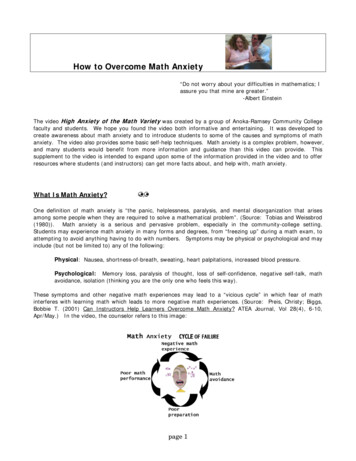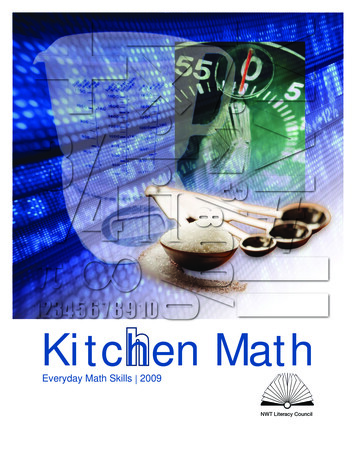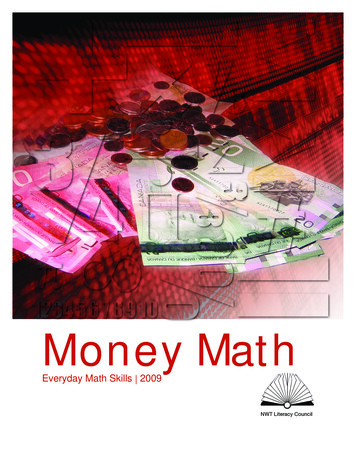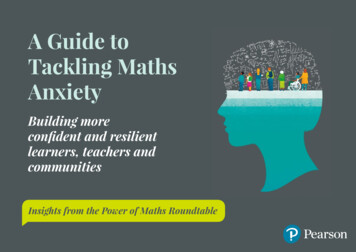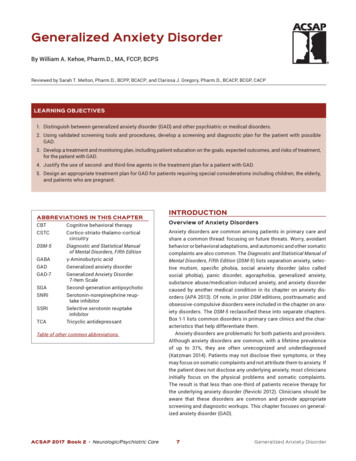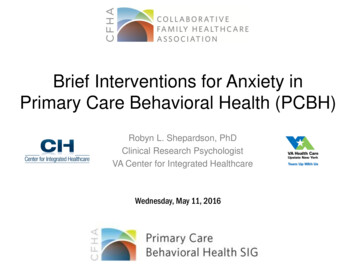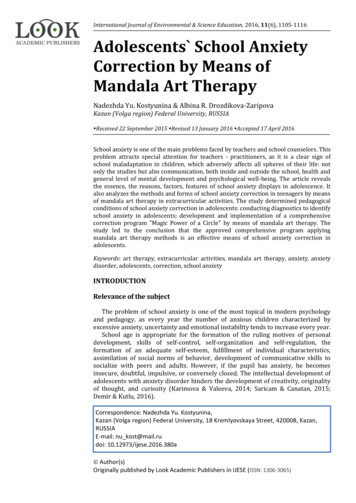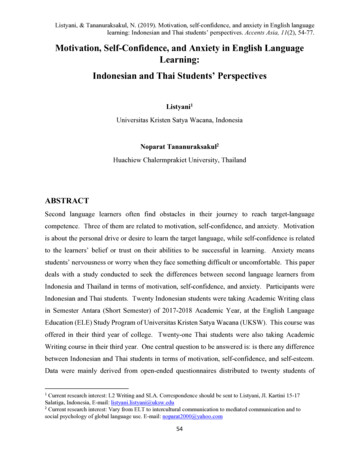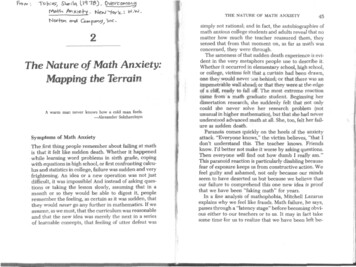
Transcription
,THE NATURE OF MATH ANXIETYThe Nature of Math Anxiety:Mapping the Terrain- knows how a cold man feels.—Alexander SolzhenitsynSymptoms of Math AnxietyThe first thing people remember about failing at mathis that it felt like sudden death. Whether it happenedwhile learning word problems in sixth grade, copingwith equations in high school, or first confronting calculus and statistics in college, failure was sudden and veryfrightening. An idea or a new operation was not justdifficult, it was impossible! And instead of asking questions or taking the lesson slowly, assuming that in amonth or so they would be able to digest it, peopleremember the feeling, as certain as it was sudden, thatthey would never go any further in mathematics. If weassume, as we must, that the curriculum was reasonableand that the new idea was merely the next in a seriesof learnable concepts, that feeling of utter defeat was45simply not rational; and in fact, the autobiographies ofmath anxious college students and adults reveal that nomatter how much the teacher reassured them, theysensed that from that moment on, as far as math wasconcerned, they were through.The sameness of that sudden death experience is evident in the very metaphors people use to describe it.Whether it occurred in elementary school, high school,or college, victims felt that a curtain had been drawn,one they would never iee behind; or that there was animpenetrable wall ahead; or that they were at the edgeof a cliff, ready to fall off. The most extreme reactioncame from a math graduate student. Beginning herdissertation research, she suddenly felt that not onlycould she never solve her research problem (notunusual in higher mathematics), but that she had neverunderstood advanced math at all. She, too, felt her failure as sudden death.Paranoia comes quickly on the heels of the anxietyattack. "Everyone knows," the victim believes, "that Idon't understand this. The teacher knows. Friendsknow. I'd better not make it worse by asking questions.Then everyone will find out how dumb I really am."This paranoid reaction is particularly disabling becausefear of exposure keeps us from constructive action. Wefeel guilty and ashamed, not only because our mindsseem to have deserted us but because we believe thatour failure to comprehend this one new idea is proofthat we have been "faking math" for years.In a fine analysis of mathophobia, Mitchell Lazarusexplains why we feel like frauds. Math failure, he says,passes through a "latency stage" before becoming obvious either to our teachers or to us. It may in fact takesome time for us to realize that we have been left be-
OVERCOMING MATH ANXIETYTHE NATURE OF MATH ANXIETYhind. Lazarus outlines the plight of the high schoolstudent who has always relied on the memorize-whatto-do approach. "Because his grades have been satisfactory, his problem may not be apparent to anyone, including himself. But when his grades finally drop, asthey must, even his teachers are unlikely to realize thathis problem is not something new, but has been in themaking for years."1It is not hard to figure out why failure to understandmathematics can be hidden for so long. Math is usuallytaught in discrete bits by teachers who were themselves taught this way; students are tested, bit by bit, asthey go along. Some of us never get a chance to integrate all these pieces of information, or even to realizewhat we are not able to do. We are aware of a lack, butthough the problem has been building up for years, thefirst time we are asked to use our knowledge in a newway, it feels like sudden death. It is not so easy to explain, however, why we take such personal responsibility for having "cheated" our teachers and why so manyof us believe that we are frauds. Would we feel thesame way if we were floored by irregular verbs inFrench?One thing that may contribute to a student's passivityis a common myth about mathematical ability. Most ofus believe that people either have or do not have amathematical mind. It may well be that mathematicalimagination and some kind of special intuitive grasp ofmathematical principles are needed for advanced research, but surely people who can do college-level workin other subjects should be able to do college-level mathas well. Rates of learning may vary. Competence undertime pressure may differ. Certainly low self-esteem willinterfere. But is there any evidence that a student46needs to have a mathematical mind in order to succeedat learning math?Leaving aside for the moment the sources of thismyth, consider its effects. Since only a few people aresupposed to have this mathematical mind, part of ourpassive reaction to difficulties in learning mathematicsis that we suspect we may not be one of "them" and arewaiting for our nonmathematical mind to be exposed.It is only a matter of time before our limit will bereached, so there is not much point in our being methodical or in attending to detail. We are grateful whenwe survive fractions, word problems, or geometry. Ifthat certain moment of failure hasn't struck yet, thenit is only temporarily postponed.Sometimes the math teacher contributes to thismyth. If the teacher claims an entirely happy history oflearning mathematics, she may contribute to the ideathat some people—specifically her—are gifted in mathematics and others—the students—are not. A goodteacher, to allay this myth, brings in the scratch paperhe used in working out the problem to share with theclass the many false starts he had to make before solvingit.Parents, especially parents of girls, often expect theirchildren to be nonmathematical. If the parents are poorat math, they had their own sudden death experience;if math was easy for them, they do not know how it feelsto be slow. In either case, they will unwittingly fosterthe idea that a mathematical mind is something oneeither has or does not have.Interestingly, the myth is peculiar to math. A teacherof history, for example, is not very likely to tell studentsthat they write poor exams or do badly on papers because they do not have a historical mind. Although we47
OVERCOMING MATH ANXIETYTHE NATURE OF MATH ANXIETYmight say that some people have a "feel" for history,the notion that one is either historical or nonhistoricalis patently absurd. Yet, because even the experts still donot know how mathematics is learned, we tend to thinkof math ability as mystical and to attribute the talent forit to genetic factors. This belief, though undemonstrable, is very clearly communicated to us all.These considerations help explain why failure tocomprehend a difficult concept may seem like suddendeath. We were kept alive so long only by good fortune.Since we were never truly mathematical, we had tomemorize things we could not understand, and bymemorizing we got through. Since we obviously do nothave a mathematical mind, we will make no progress,ever. Our act is over. The curtain down-in the way. The problem is not that there is anythingwrong with math; it is that we are not properly initiatedinto its vocabulary and rules of grammar.Some math disabled adults will remember, afterfifteen to thirty years, that the word "multiply" as usedfor fractions never made sense to them. "Multiply,"they remember wistfully, always meant "to increase."That is the way the word was used in the Bible, in othercontexts, and surely the way it worked with wholenumbers. (Three times six always produced somethinglarger than either three or six.) But with fractions (except the improper fractions), multiplication always results in something of smaller value. One-third timesone-fourth equals one-twelfth, and one-twelfth is considerably smaller than either one-third or one-fourth.Many words like "multiply" mean one thing (like"increase rapidly") when first introduced. But in thelarger context (in this case all rational numbers), theapparently simple meaning becomes confusing. Sincestudents are not warned that "multiplying" has verydifferent effects on fractions, they find themselvessearching among the meanings of the word to find outwhat to do. Simple logic, corresponding to the wordsthey know and trust, seems not to apply.A related difficulty for many math anxious peopleis the word "of as applied to fractions. In generalusage, "of can imply division, as in "a portion of."Yet, with fractions, one-third of one-fourth requiresmultiplication. We can only remember this by suspending our prior associations with the word "of," orby memorizing the rule. Or, take the word "cancel"as used carelessly with fractions. We were told to"cancel numerators and denominators" of fractions.Yet nothing is being "cancelled" in the sense of48Ambiguity, Real and ImaginedWhat is a satisfactory definition? For the philosopher or the scholar, a definition is satisfactoryif it applies to those things and only thosethings that are being defined; this is what logicdemands. But in teaching, this will not do: adefinition is satisfactory only if the students understand it.—H. PoincareMathematics autobiographies show that for the beginning student the language of mathematics is full ofambiguity. Though mathematics is supposed to have avery precise language, more precise than our everydayuse (this is why math uses symbols), it is true that mathematical terms are never wholly free of the connotationswe bring to words, and these layers of meaning may get
OVERCOMING MATH ANXIETYTHE NATURE OF MATH ANXIETYbeing removed for all time. The same holds true fornegative numbers. Once we have learned to associate the minus sign with subtraction, it takes an explicit lesson to unlearn the old meaning of minus; or, asa mathematician would put it, to learn its meaningas applied to a new kind of number.Knowles Dougherty, a skilled teacher of mathematics, notes:It is no wonder that children have trouble learning arithmetic. If you ask an obedient child in first grade, "What is Zero,"the child will call out loudly and with certainty, "Zero isnothing." By third grade, he had better have memorized that"Zero is a place-holder." And by fifth grade, if he believesthat zero is a number that can be added, subtracted, multiplied by and divided by, he is in for trouble.2People also recall having problems with shapes,never being sure for example whether the word "circle" meant the line around the circle or the spacewithin. Students who had such difficulties felt theywere just dumber than everyone else, but in fact theword "circle" needs a far more precise definition. It isin fact neither the circumference nor the area butrather "the locus of points in the plane equidistant froma center" (Fig. II-l).*A mind that is bothered by ambiguity—actual or perceived—is not usually a weak mind, but a strong one.This point is important because mathematicians arguethat it is not the subject that is fuzzy but the learnerwho is imprecise. This may be, but as mathematics isoften taught to amateurs differences in meaning be One student, learning to find the "least common denominator," took the-most unusual denominator" she could find. Instead of finding the smallestcommon denominator, then, she found a very large one and was appropriately chastised by her teacher for misunderstanding the question.** **tween common language and mathematical languageneed to be discussed. Besides, even if mathematicallanguage is unambiguous, there is no way into it exceptthrough our spoken language, in which words areloaded with content and associations. We cannot helpbut think "increase" when we hear the word "multiply" because of all the other times we have used thatword. We have been coloring circles for years beforewe get to one we have to measure. No wonder we areunsure of what "circle" means. People who do a littlebetter in mathematics than the rest of us are not asbothered by all this. We shall consider the possible reasons for this later on.Meanwhile, the mathematicians withhold information. Mathematicians depend heavily upon customarynotation. They have a prior association with almostevery letter in the Roman and Greek alphabets, which
gzOVERCOMING MATH ANXIETYthey don't always tell us about. We think that our teachers are choosing X or a or delta (A) arbitrarily. Not so.Ever since Descartes, the letters at the end of the alphabet have been used to designate unknowns, the letters at the beginning of the alphabet usually to signifyconstants, and in math, economics, and physics generally A means "change" or "difference." Though thesesymbols appear to us to be chosen randomly, the lettersare loaded with meaning for "them."In more advanced algebra, the student's search formeaning is made even more difficult because it is almost impossible to visualize complex mathematical relationships. For me, the fateful moment struck when Iwas confronted by an operation I could neither visualize nor translate into meaningful words. The expressionX z \2 did me in. I had dutifully learned that exponents such as2 and 3 were shorthand notations for multiplication: a number or a letter squared or cubed wassimply multiplied by itself twice or three times. Tryingto translate math into words, I considered the possibility that X 2 meant something like "X not multiplied byitself or "multiplied by not-itself." What words or images could convey to me what X * really meant? To allthese questions—and I have asked them many timessince—the answer is that X * ja is a definition consistent with what has gone before. I have been shownseveral demonstrations that this definition is indeedconsistent with what has gone before.* But at the time While interviewing for this book, I have finally found out that negativetwo is a different kind of number from positive two and that it was naive ofe to think that it would have the same or similar effect on X. And it doesdivide]end up wwith Ii. SeSee the following:v-2A— iL -'- XXX- 1 - JLx* xxxxx xx x*THE NATURE OF MATH ANXIETYI did not want a demonstration or a proof. I wanted anexplanation!I dwell on the X-2 exampl
48 OVERCOMING MATH ANXIETY might say that some people have a "feel" for history, the notion that one is either historical or nonhistorical is patently absurd. Yet, becaus e even the experts still do not know how mathematics is learned, we tend to think of math ability as mystical an d to attribute the talent for it to genetic factors. This belief, though undemonstra-
